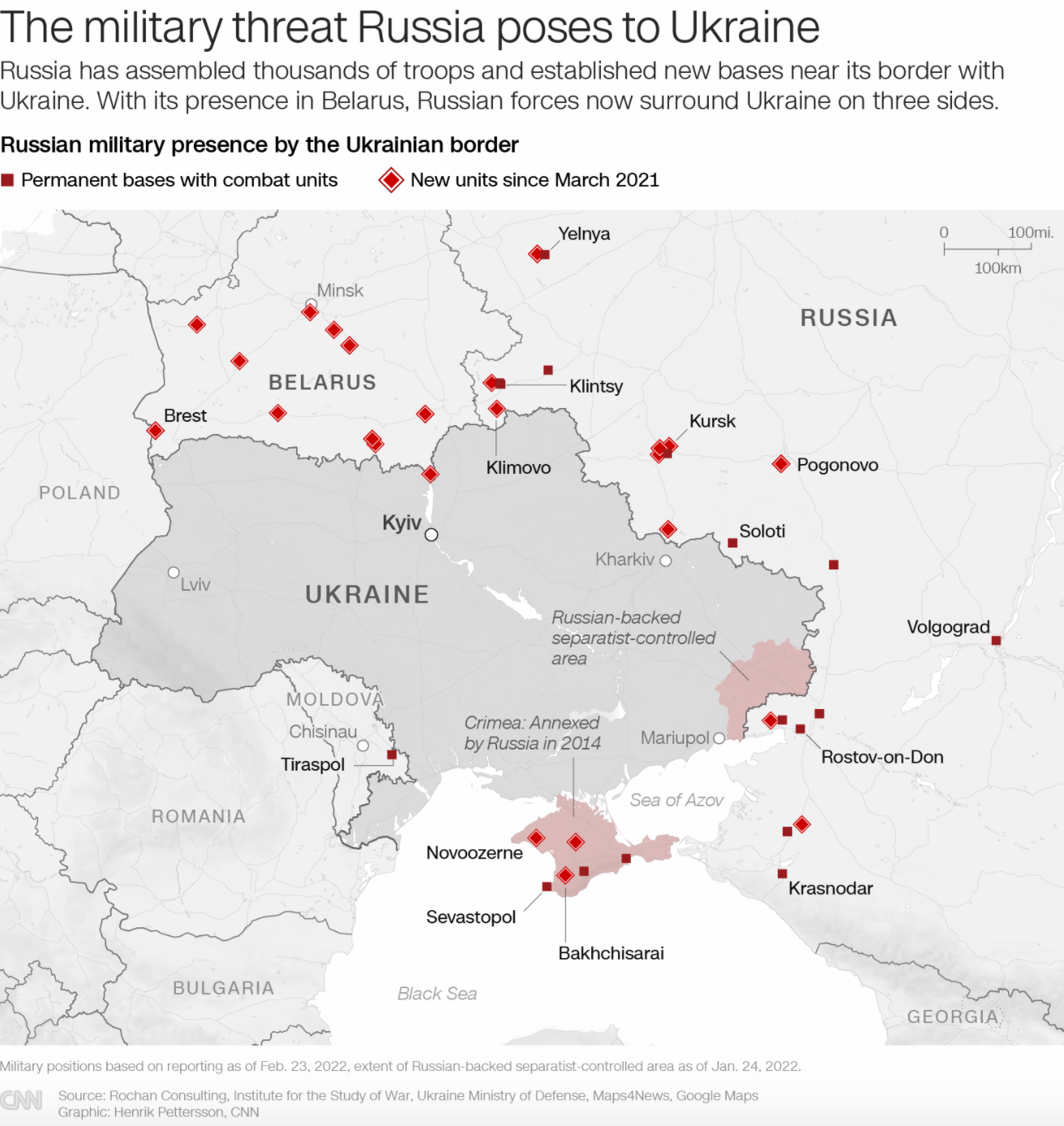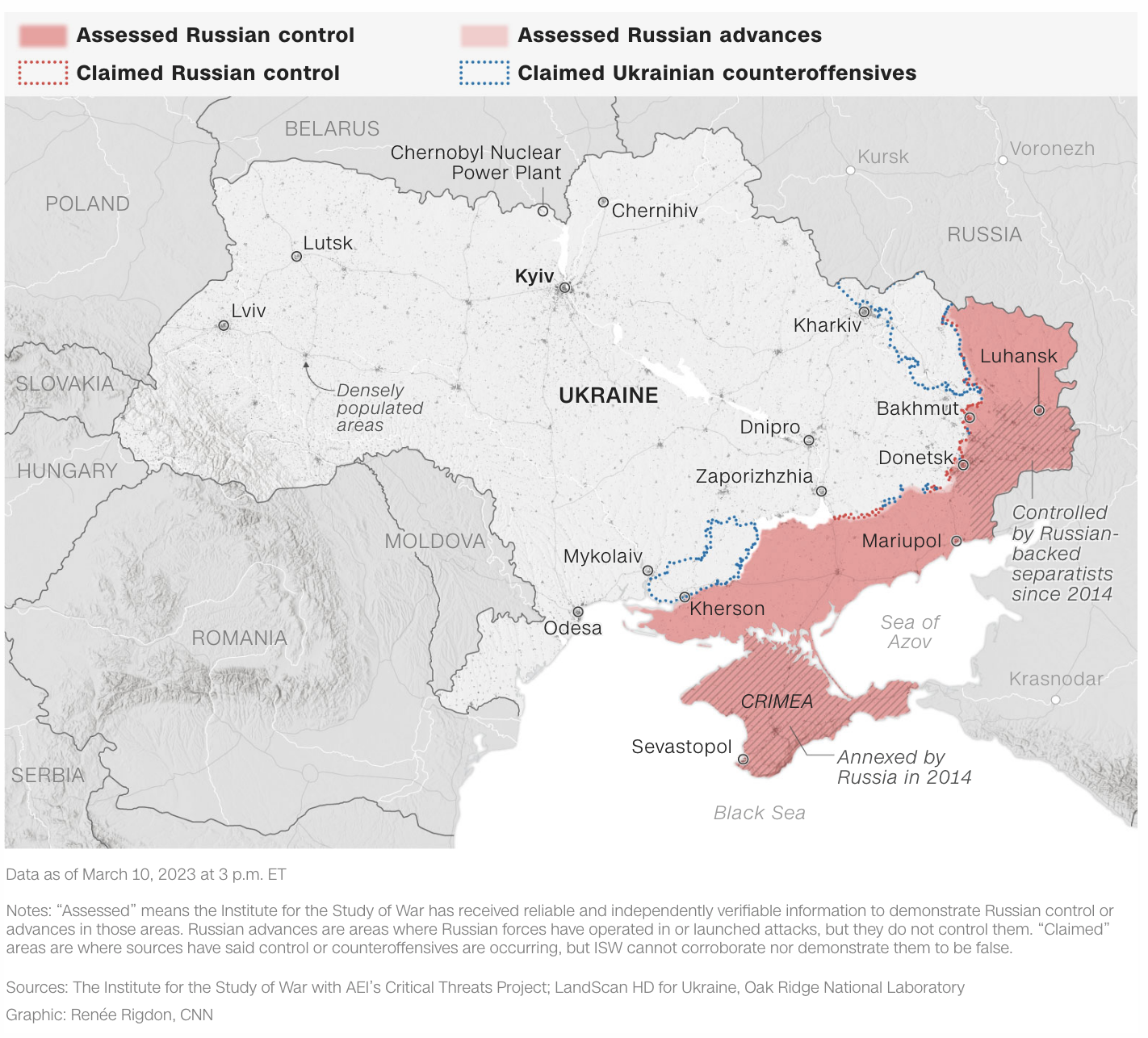Ukraine: Current Events And The Path Forward
The ongoing conflict in Ukraine has captured the world's attention, leaving many seeking insights into its complexities and potential outcomes.

80% of Russian forces at Ukraine's border are in "forward positions - Source www.cnn.com
Editor's Notes:
Highlighting "Ukraine: Current Events And The Path Forward" published today, December 15, 2022, this guide aims to provide a comprehensive understanding of the current situation and explore the potential paths forward for Ukraine, given its critical implications for regional and global security.
Through extensive analysis and diligent research, this guide endeavors to empower readers with the knowledge and context necessary to make informed judgments about the multifaceted challenges Ukraine faces today.
Key Differences or Key Takeaways:
Transition to main article topics:
The guide delves into various aspects of the conflict, including:
- Historical Background and Context
- Current Military Situation and Humanitarian Crisis
- Political Dynamics and International Responses
- Potential Paths Forward and Challenges
- Implications for Regional and Global Security
Understanding "Ukraine: Current Events And The Path Forward" is crucial for anyone interested in international relations, conflict resolution, or the future of Europe. This guide serves as a valuable resource for policymakers, journalists, researchers, and the general public seeking an in-depth understanding of this complex and evolving situation.
FAQ
This section addresses common concerns and misconceptions regarding the current events and the path forward in Ukraine.

Russian Invasion of Ukraine: Ukraine Will Push to Reclaim More - Source www.nytimes.com
Question 1: What are the main causes of the current conflict in Ukraine?
The conflict in Ukraine stems from a complex interplay of historical, political, and geopolitical factors. Key factors include Russia's annexation of Crimea in 2014, the ongoing war in eastern Ukraine between Ukrainian forces and Russian-backed separatists, and Russia's concerns over Ukraine's potential integration with Western institutions.
Question 2: What are the potential consequences of the conflict for Ukraine and the region?
The conflict has had devastating consequences for Ukraine, including loss of life, displacement of civilians, and damage to infrastructure. It has also raised concerns about regional stability and the potential for escalation between Russia and Ukraine's Western allies.
Question 3: What are the prospects for a peaceful resolution to the conflict?
Efforts to find a diplomatic solution to the conflict have faced significant challenges. A ceasefire agreement reached in 2015 has been repeatedly violated, and peace talks have failed to make substantial progress. However, international diplomatic efforts continue, and there is hope that a peaceful settlement can be achieved.
Question 4: What is the role of the international community in addressing the conflict?
The international community has played a significant role in responding to the conflict. The United Nations has provided humanitarian assistance and facilitated diplomatic efforts. Western countries have imposed sanctions on Russia and provided military aid to Ukraine. However, the international response has also been limited, and there are concerns about the effectiveness of sanctions and the risk of escalation.
Question 5: What are the implications of the conflict for the global order?
The conflict in Ukraine has raised concerns about the future of the global order and the role of international law. The Russian invasion has challenged the principles of territorial integrity and sovereignty, and has raised questions about the effectiveness of international institutions in preventing and resolving conflicts.
Question 6: What is the path forward for Ukraine and the region?
The path forward for Ukraine and the region is complex and uncertain. A peaceful resolution to the conflict is essential for the future stability and prosperity of Ukraine and the region. International diplomacy, economic recovery, and political reconciliation will be critical to achieving a lasting peace.
The situation in Ukraine remains fluid and complex. Ongoing diplomatic efforts and developments on the ground will shape the path forward. It is essential to stay informed about the latest developments and to support efforts aimed at achieving a peaceful resolution to the conflict.
Transition to the next article section:
Tips for Keeping Up with Current Events in Ukraine
Finding reliable and comprehensive information about the situation in Ukraine can be challenging. Use the following tips to stay informed:
Tip 1: Rely on Trusted Sources
Stick to reputable news outlets known for their accuracy and impartiality. Consider organizations like the BBC, Reuters, or The New York Times.
Tip 2: Fact-Check Information
Be critical of information, especially from social media or less-established sources. Verify claims by cross-referencing them with multiple reputable sources.
Tip 3: Seek Expert Analysis
Listen to commentary from experts, such as political analysts, military strategists, or Ukrainian officials. They can provide valuable insights and context.
Tip 4: Look for Independent Perspectives
Consider sources that provide perspectives from all sides of the conflict. This helps avoid bias and gain a more comprehensive understanding.
Tip 5: Be Aware of Propaganda
Be mindful of propaganda from Russia and other parties involved. Skeptically evaluate information presented as biased or intended to influence opinions.
Ukraine: Current Events And The Path Forward. Despite the challenges, staying informed about the situation in Ukraine is crucial to understanding its impact and supporting efforts towards resolution.
Note: The situation in Ukraine is complex and rapidly evolving. It is essential to consult multiple trusted sources and seek expert analysis to stay up-to-date on the latest developments.
Ukraine: Current Events And The Path Forward
The ongoing war in Ukraine has profound implications, shaping current events and charting a path forward with serious consequences.
- Russian Aggression: Russia's invasion and annexation of Ukrainian territory has escalated tensions.
- Global Impact: The conflict has disrupted energy markets and exacerbated humanitarian crises, affecting the world.
- Resilient Resistance: Ukraine's valiant resistance has surprised many and bolstered international support.
- Diplomatic Efforts: Negotiations and mediation attempts have been ongoing, but a lasting solution remains elusive.
- Humanitarian Crisis: Millions have been displaced, and infrastructure damage has led to severe hardships for civilians.
- Post-Conflict Reconstruction: The aftermath of the war will require significant efforts to rebuild and address its socio-economic impacts.

How Russia’s territory control in Ukraine has shifted - CNN - Source www.cnn.com
These aspects are interconnected and crucial for understanding Ukraine's current situation and the path forward. Russian aggression has profoundly impacted global dynamics, while Ukraine's resilience has inspired admiration. Diplomatic efforts must continue to seek a peaceful resolution, recognizing the human toll of the conflict. Post-conflict reconstruction will be a long and challenging process, but it is essential for Ukraine's future. The war in Ukraine is a stark reminder of the fragility of peace and the importance of addressing geopolitical challenges through dialogue and cooperation.
Ukraine: Current Events And The Path Forward
The ongoing conflict in Ukraine has profound implications for the nation's future. The military offensive launched by Russia in February 2022 has resulted in significant loss of life, displacement of millions of people, and extensive damage to infrastructure. The conflict has also had a significant impact on the global economy, particularly in terms of energy prices and food security.

March 11, 2023 - Russia's war in Ukraine - Source www.cnn.com
The path forward for Ukraine is complex and challenging. The country faces the daunting task of rebuilding its infrastructure, addressing the humanitarian crisis, and ensuring the safety and security of its citizens. International support will be crucial in helping Ukraine overcome these challenges and achieve stability and prosperity in the years to come.
The conflict in Ukraine has also highlighted the importance of promoting peace and stability in Europe and beyond. The war has demonstrated the devastating consequences of aggression and the need for a collective commitment to conflict prevention and resolution. The international community must continue to work together to find diplomatic solutions to conflicts and promote dialogue and understanding.
In conclusion, the conflict in Ukraine is a complex and challenging issue with significant implications for the nation's future and for global peace and stability. The path forward for Ukraine requires a commitment to peace, reconstruction, and international cooperation.